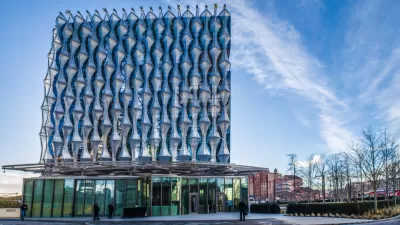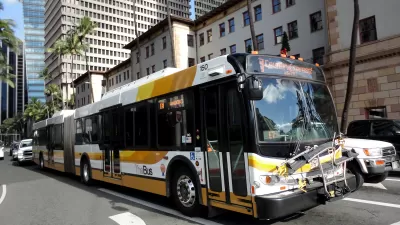While the cultural and infrastructural changes necessary to eliminate carbon emissions from the transportation sector still seem far-fetched, scaling up a net zero building boom is “eminently possible.”

An article by James S. Russell for Bloomberg reports on the emissions reductions available almost immediately if efficiency measures are prioritized in buildings.
According to Russell, an “ever-growing panoply of efficiency measures” such as better insulation, improved heating and air-conditioning, less-polluting appliances could rapidly decarbonize the building sector. “By 2030, almost all new buildings could consume zero net energy — net meaning there’s some give and take from the grid to equal zero use.”
According to various experts cited in the article, all the building sector needs is an economy of scale to achieve massive reductions in energy use.
“Acting at scale is so eminently possible.” -Lindsay Baker, CEO of the International Living Futures Institute (IFLI)
The article cites examples provided by organizations like IFLI, multiple architects and engineers, and concepts like the passive house to show the way to net zero buildings everywhere.
“There’s no shortage of compelling reasons to encourage emission-cutting tools and tactics such as these, whether to conserve cash, save the planet or undermine petro-tyrants,” writes Russell to summarize the case for building efficiency. “Here’s one more: The race to net zero would trigger a U.S. green-job-building boom.”
FULL STORY: It’s Time for a Net Zero Building Boom

Planetizen Federal Action Tracker
A weekly monitor of how Trump’s orders and actions are impacting planners and planning in America.

Map: Where Senate Republicans Want to Sell Your Public Lands
For public land advocates, the Senate Republicans’ proposal to sell millions of acres of public land in the West is “the biggest fight of their careers.”

Restaurant Patios Were a Pandemic Win — Why Were They so Hard to Keep?
Social distancing requirements and changes in travel patterns prompted cities to pilot new uses for street and sidewalk space. Then it got complicated.

DC Area County Eliminates Bus Fares
Montgomery County joins a growing trend of making transit free.

Platform Pilsner: Vancouver Transit Agency Releases... a Beer?
TransLink will receive a portion of every sale of the four-pack.

Toronto Weighs Cheaper Transit, Parking Hikes for Major Events
Special event rates would take effect during large festivals, sports games and concerts to ‘discourage driving, manage congestion and free up space for transit.”
Urban Design for Planners 1: Software Tools
This six-course series explores essential urban design concepts using open source software and equips planners with the tools they need to participate fully in the urban design process.
Planning for Universal Design
Learn the tools for implementing Universal Design in planning regulations.
Heyer Gruel & Associates PA
JM Goldson LLC
Custer County Colorado
City of Camden Redevelopment Agency
City of Astoria
Transportation Research & Education Center (TREC) at Portland State University
Camden Redevelopment Agency
City of Claremont
Municipality of Princeton (NJ)





























